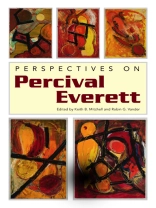Percival Everett (b. 1956) writes novels, short stories, poetry, and essays and is one of the most prolific, acclaimed, yet underexamined African American authors working today. Although to date Everett has published eighteen novels, three collections of short fiction, three poetry collections, and one children’s book, his work has not garnered the critical attention that it deserves. Perhaps one of the most vexing problems scholars have had in trying to situate Everett’s work is that they have found it difficult to place him and his work within a prescribed African American literary tradition. Because he happens to be African American, critics have expectations of so-called authentic African American fiction; however, his work often thwarts these expectations.
In
Perspectives on Percival Everett, scholars engage all of his creative production. On the one hand, Everett is an African American novelist. On the other hand, he pursues subject matters that seemingly have little to do with African American culture. The operative word here is “seemingly;” for as these essays demonstrate, Everett’s works falls well within
as well as outside of what most critics would deem the African American literary tradition. These essays examine issues of identity, authenticity, and semiotics, in addition to postmodernism and African American and American literary traditions—issues essential to understanding his aesthetic and political concerns.
About the author
Robin G. Vander is associate professor in the Department of English at Xavier University of Louisiana. She is coeditor of Percival Everett: Writing Other/Wise (2014) and Perspectives on Percival Everett (2013). She is coeditor of two issues of the Xavier Review: “Celebrating Jesmyn Ward: Critical Readings and Scholarly Responses” (2018) and “Reading the Intersections of Sex and Spirit in the Creative Arts” (2007). Her article “The African American Population in New Orleans after Hurricane Katrina” appears in The Review of Black Political Economy (2011).












